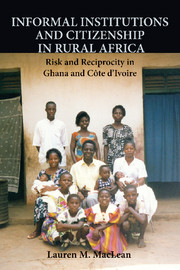 Informal Institutions and Citizenship in Rural Africa
Informal Institutions and Citizenship in Rural Africa Book contents
- Frontmatter
- Contents
- List of Tables and Figures
- List of Abbreviations
- Acknowledgments
- PART I THE TRANSFORMATION OF INFORMAL INSTITUTIONS OF SOCIAL RECIPROCITY IN GHANA AND CÔTE D'IVOIRE
- PART II LEGACIES OF THE STATE ROLE IN MEDIATING RISK IN GHANA AND CÔTE D'IVOIRE
- 4 The Legacies of the Colonial Administrative State in Constructing the Citizen, Family, and Community Roles
- 5 The Construction and Retrenchment of State Social Service Provision and the Unintended Consequences for Reciprocity
- 6 The Empire of the Young: Contrasting Legacies of State Agricultural Policy for Local Capitalism and Reciprocity
- PART III INFORMAL INSTITUTIONS OF RECIPROCITY AND THE PROSPECTS FOR DEMOCRATIC CITIZENSHIP
- 8 Conclusion
- Appendix
- Bibliography
- Index
- Titles in the series
6 - The Empire of the Young: Contrasting Legacies of State Agricultural Policy for Local Capitalism and Reciprocity
Published online by Cambridge University Press: 05 May 2010
- Frontmatter
- Contents
- List of Tables and Figures
- List of Abbreviations
- Acknowledgments
- PART I THE TRANSFORMATION OF INFORMAL INSTITUTIONS OF SOCIAL RECIPROCITY IN GHANA AND CÔTE D'IVOIRE
- PART II LEGACIES OF THE STATE ROLE IN MEDIATING RISK IN GHANA AND CÔTE D'IVOIRE
- 4 The Legacies of the Colonial Administrative State in Constructing the Citizen, Family, and Community Roles
- 5 The Construction and Retrenchment of State Social Service Provision and the Unintended Consequences for Reciprocity
- 6 The Empire of the Young: Contrasting Legacies of State Agricultural Policy for Local Capitalism and Reciprocity
- PART III INFORMAL INSTITUTIONS OF RECIPROCITY AND THE PROSPECTS FOR DEMOCRATIC CITIZENSHIP
- 8 Conclusion
- Appendix
- Bibliography
- Index
- Titles in the series
Summary
Different legacies of state formation have structured and restructured the informal institutions of reciprocity in diverse ways in these two regions of Ghana and Côte d'Ivoire. While it may be more apparent how the history of the state's interventions in political administration and social service provision would influence patterns of informal reciprocity, it is important to look beyond these two policy areas to investigate a less-obvious one: the state's role in agricultural policy over time. Village residents in these neighboring regions have experienced the state's agricultural policies differently at the local level, and thus have responded with dissimilar production choices at various points in history. This chapter examines how a recent dramatic shift in local-level production strategies has influenced local social relations, spurring a redefinition of the boundaries of social and political exclusion.
RECENT DIVERGENCE IN LOCAL CASH CROP PRODUCTION IN GHANA AND CÔTE D'IVOIRE
In the late 1990s, farmers in these two regions were choosing different cash crops. Tomatoes were becoming the new cash crop of the young in Ghana, whereas cocoa remained the primary cash crop in Côte d'Ivoire. This was a recent divergence in local production strategies with important implications for the informal institutions of reciprocity.
New Tribulations for the Cocoa Farmer
Since at least the early 1930s, cocoa has been the main crop grown in the two fieldsite regions. Cocoa was first established in Côte d'Ivoire and Ghana in other nearby regions of the same umbrella Akan ethnic group, but quickly spread to the research areas.
- Type
- Chapter
- Information
- Informal Institutions and Citizenship in Rural AfricaRisk and Reciprocity in Ghana and Côte d'Ivoire, pp. 164 - 196Publisher: Cambridge University PressPrint publication year: 2010
